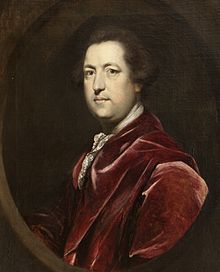
Back قوانين تاونسند Arabic Townshendovy zákony Czech Townshend Acts German قوانین تاونزند Persian Townshendin lait Finnish Townshend Acts French חוקי טאונסנד HE Townshend Acts Italian タウンゼンド諸法 Japanese 타운젠드 법 Korean

| Part of a series on the |
| American Revolution |
|---|
 |
|
|
The Townshend Acts (/ˈtaʊnzənd/)[1] or Townshend Duties were a series of British acts of Parliament passed during 1767 and 1768 introducing a series of taxes and regulations to fund administration of the British colonies in America. They are named after the Chancellor of the Exchequer who proposed the programme. Historians vary slightly as to which acts they include under the heading "Townshend Acts", but five are often listed:[a]
- The Revenue Act 1767 passed on 29 June 1767.
- The Commissioners of Customs Act 1767 passed on 29 June 1767.
- The Indemnity Act 1767 passed on 2 July 1767.
- The New York Restraining Act 1767 passed on 2 July 1767.
- The Vice Admiralty Court Act 1768 passed on 8 March 1768.
The purposes of the acts were to
- raise revenue in the colonies to pay the salaries of governors and judges so that they would remain loyal to Great Britain,
- create more effective means of enforcing compliance with trade regulations,
- punish the Province of New York for failing to comply with the 1765 Quartering Act, and
- establish the precedent that the British Parliament had the right to tax the colonies.[4]
The Townshend Acts met resistance in the colonies. People debated them in the streets, and in the colonial newspapers. Opponents of the Acts gradually became violent, leading to the Boston Massacre of 1770. The Acts placed an indirect tax on glass, lead, paints, paper, and tea, all of which had to be imported from Britain. This form of revenue generation was Townshend's response to the failure of the Stamp Act 1765, which had provided the first form of direct taxation placed upon the colonies. However, the import duties proved to be similarly controversial. Colonial indignation over the acts was expressed in John Dickinson's Letters from a Farmer in Pennsylvania and in the Massachusetts Circular Letter. There was widespread protest, and American port cities refused to import British goods, so Parliament began to partially repeal the Townshend duties.[5] In March 1770, most of the taxes from the Townshend Acts were repealed by Parliament under Frederick, Lord North. However, the import duty on tea was retained in order to demonstrate to the colonists that Parliament held the sovereign authority to tax its colonies, in accordance with the Declaratory Act 1766. The British government continued to tax the American colonies without providing representation in Parliament. American resentment, corrupt British officials, and abusive enforcement spurred colonial attacks on British ships, including the burning of the Gaspee in 1772. The Townshend Acts' taxation of imported tea was enforced once again by the Tea Act 1773, and this led to the Boston Tea Party in 1773 in which Bostonians destroyed a large shipment of taxed tea. Parliament responded with severe punishments in the Intolerable Acts 1774. The Thirteen Colonies drilled their militia units, and war finally erupted in Lexington and Concord in April 1775, launching the American Revolution.
- ^ "Townshend Acts". Dictionary.com. Archived from the original on 30 January 2023. Retrieved 13 April 2020.
- ^ Dickerson (1951), pp. 195–95.
- ^ Chaffin (1999), p. 128.
- ^ Chaffin (1999), p. 126.
- ^ Chaffin (1999), p. 143.
Cite error: There are <ref group=lower-alpha> tags or {{efn}} templates on this page, but the references will not show without a {{reflist|group=lower-alpha}} template or {{notelist}} template (see the help page).
© MMXXIII Rich X Search. We shall prevail. All rights reserved. Rich X Search